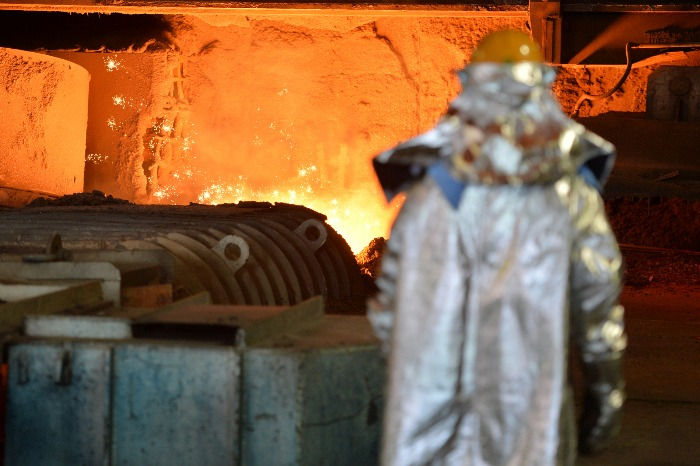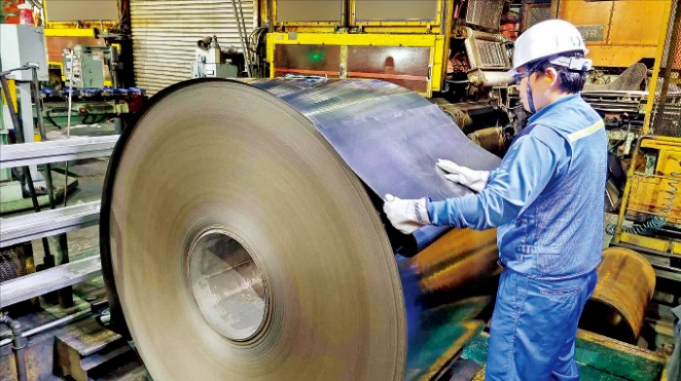Steel
Korean steelmakers accuse Japanese rivals of product dumping
Korean steel companies may call for an anti-dumping probe into Japanese imports
By Jan 10, 2023 (Gmt+09:00)
2
Min read
Most Read
LG Chem to sell water filter business to Glenwood PE for $692 million


Kyobo Life poised to buy Japan’s SBI Group-owned savings bank


KT&G eyes overseas M&A after rejecting activist fund's offer


StockX in merger talks with Naver’s online reseller Kream


Mirae Asset to be named Korea Post’s core real estate fund operator



Korean steelmakers such as POSCO Co. and Dongkuk Steel Mill Co. have accused Japanese competitors of sharply lowering their prices in South Korea to make up for declining sales at home.
In their local market, Japanese steel producers such as Nippon Steel Corp. sharply bumped up their prices to reflect a surge in iron ore and coal prices.
The steps Korean steel manufacturers may take against Japanese imports include requesting an anti-dumping probe into Japanese imports to levy countervailing duties.
Imposing anti-dumping duties might be the best option for Korean steelmakers for now, given the lack of policy measures to protect them from price dumping by foreign rivals, according to industry officials on Tuesday.
Over the past three years, South Korea has increased hot-rolled steel imports from Japan. Their imports were up 12% on-year to 482,475 tons in the fourth quarter of last year, according to the Korea Iron & Steel Organization.
Compared to the previous quarter, fourth-quarter imports surged 31%.

The rising import volume came after Japanese steelmakers sharply increased their domestic prices.
Toyota Motor Corp., the largest customer for Japanese steel producers, agreed to pay 20 to 30% more for automotive steel sheets from Nippon Steel for the second half of 2022, compared to the first half. Their fiscal year 2022 ends in March 2023.
Under the agreement, Toyota is now paying 40,000 yen ($303) per ton for steel sheets.
For hot-rolled steel plates in general, Japan’s export price dropped to $515 per ton last December from $770 in July 2022 on a free-on-board basis.
The December price is about 20% lower than their domestic price and has remained below that of Chinese steel products shipped to South Korea since August of last year.
The alleged dumping strategy by Japanese companies could put downward pressure on South Korean steel prices, not only for hot-rolled plates but also for other steel sheets.
Unlike Seoul, which lacks market protection tools, Europe implements safeguard measures against anti-dumping practices.
India’s minimum import price scheme is aimed at protecting Indian steel mills from low-price imports.
Write to Seo-Woo Jang at suwu@hankyung.com
Yeonhee Kim edited this article
More to Read
-
 EarningsPOSCO Holdings' Q3 profit tumbles on steel mill shutdown
EarningsPOSCO Holdings' Q3 profit tumbles on steel mill shutdownOct 19, 2022 (Gmt+09:00)
1 Min read -
 SteelPOSCO says normalization of typhoon-hit steel mill unlikely until Q1 2023
SteelPOSCO says normalization of typhoon-hit steel mill unlikely until Q1 2023Sep 29, 2022 (Gmt+09:00)
2 Min read -
 SteelPOSCO, Krakatau to expand Indonesia steel mill for $3.5 bn
SteelPOSCO, Krakatau to expand Indonesia steel mill for $3.5 bnJul 28, 2022 (Gmt+09:00)
2 Min read
Comment 0
LOG IN


